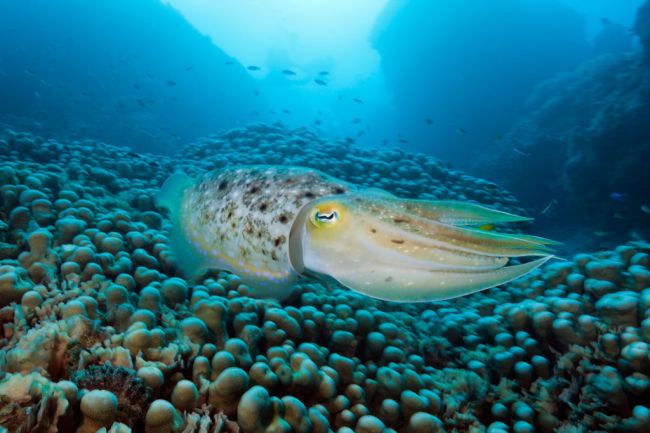
Getty Image / Reinhard Dirscherl\ullstein bild via Getty Images
Cephalopods, which include squid, octopus, cuttlefish, and nautilus, are definitely aliens. But you don’t have to take my word and H.P. Lovecraft’s word for it, there are 33 scientists from around the world that claim octopuses are aliens from outer space that were brought to Earth by meteors. There is a new study that found that these sea-dwelling alien creatures are as smart as a human child when it comes to a cognitive test. I’m not sure if this is an amazing feat by the cephalopods or pointing out how disappointing human children are.
Researchers tested the self-control of cuttlefish, and it turns out these little cephalopods have more willpower than you have when left alone with the last slice of pizza after everyone went to bed after a party. The scientists discovered that cuttlefish passed the same cognitive test that is given to human children.
Scientists created a special test for the cuttlefish based on the Stanford marshmallow experiment, a test developed in 1970 by Walter Mischel, a professor of psychology at Stanford University. The original experiment was a test in delayed gratification. A marshmallow would be presented to a preschool child, but if the child resisted the urge to stuff all that marshmallow goodness in their mouth for a couple of minutes, they would be rewarded with a second marshmallow treat. The experiment was to test the connections between self-control, and to show at what age humans develop cognitive skills to delay gratification for a benefit.
Flash forward to 2020, and scientists conducted their own marshmallow experiment with cuttlefish, but the prize was not marshmallows. “We adapted the Stanford marshmallow test so that it was more cuttlefish ‘friendly,” said Alexandra Schnell of the University of Cambridge, a behavioral ecologist who was one of the top researchers on the project. No marshmallows for the cuttlefish, instead they were tempted with crab meat and shrimp.
“This involved first testing the food preferences of each individual cuttlefish that was involved in the study and then using their first preference as the delayed reward and their second preference as the tempting immediate reward,” Schnell said. Don’t you wish you had that willpower on Taco Tuesday?
“So they designed another test, for six common cuttlefish,” Science Alert reported. “The cuttlefish were placed in a special tank with two enclosed chambers that had transparent doors so the animals could see inside. In the chambers were snacks – a less-preferred piece of raw king prawn in one, and a much more enticing live grass shrimp in the other.”
Does that mean that calamari is now considered “smart food?”
“The doors also had symbols on them that the cuttlefish had been trained to recognize,” the report stated. “A circle meant the door would open straight away. A triangle meant the door would open after a time interval between 10 and 130 seconds. And a square, used only in the control condition, meant the door stayed closed indefinitely. In the test condition, the prawn was placed behind the open door, while the live shrimp was only accessible after a delay. If the cuttlefish went for the prawn, the shrimp was immediately removed.”
I for one, welcome our new cephalopod overlords.
“Our understanding of why self-control evolved has always been based on evolutionary pressures that are relevant to long-lived social species,” said Schnell. “Cuttlefish have not experienced the same pressures.”
“This finding is an extreme example of convergent evolution,” Schnell added. “Cuttlefish have significantly different evolutionary histories from the more commonly studied apes, corvids, and parrots, and yet they have the same cognitive feature.”
“Cuttlefish in the present study were all able to wait for the better reward and tolerated delays for up to 50-130 seconds, which is comparable to what we see in large-brained vertebrates such as chimpanzees, crows and parrots,” Schnell said. Previously, scientists had been amazed at the level of delayed gratification that parrots, primates, and corvids (crows and ravens) have exhibited. But the cephalopods, that comes from the Greek word “kephalópoda” which means “head foot,” were able to exhibit excellent cognitive abilities.
The researchers also gave another test to the cuttlefish, AKA sepia officinalis for the science nerds out there.
“The other part of the experiment was to test how good the six cuttlefish were at learning. They were shown two different visual cues, a grey square and a white one. When they approached one, the other would be removed from the tank; if they made the “correct” choice, they would be rewarded with a snack.
Once they had learnt to associate a square with a reward, the researchers switched the cues, so that the other square now became the reward cue. Interestingly, the cuttlefish that learnt to adapt to this change the quickest were also the cuttlefish that were able to wait longer for the shrimp reward.”
People will say, “These are intelligent, sentient beings, and eating them is inhumane.” I’m going the other way with this one. Since these aliens are intelligent, sentient beings, let’s show them who is at the top of the food chain so they don’t evolve and rise up to conquer humans with all their alien powers.
Listen, if we don’t show these aliens who is boss, they’ll evolve and start eating us. The Italians know what’s up, in Venice they prepare Seppie al Nero alla Veneziana, a glorious dish of cuttlefish stewed in its own black ink served on a heavenly plate of spaghetti. They’re not waiting to be dominated by Cuthulu.
The team’s research has been published in Proceedings of the Royal Society B.
RELATED: Study Finds Octopuses Are Thugs That Punch Fish For No Reason – The Internet Reacts